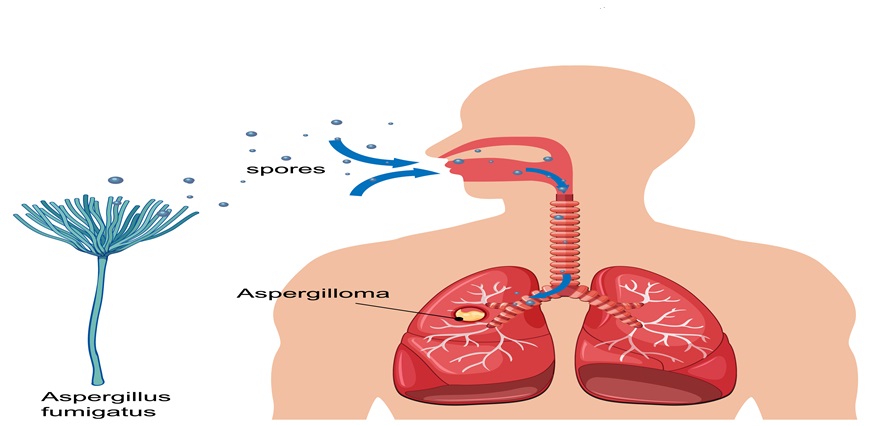





No lab centers are available in this city

Max Lab
Jul 25, 2024
Aspergillosis is a fungal infection caused by Aspergillus, a species of mould. This mould species are found all over the world and has more than 180 identified types. Although most of these moulds are harmless, a few are known to cause a variety of health issues in humans. Ranging from simple allergic reactions to life-threatening conditions, these health issues are collectively defined as aspergillosis.
There are three different types of aspergillosis:
The only cause of aspergillosis disease is exposure to aspergillus. Generally, this fungus grows on dead leaves, stored grain, compost piles, or in decaying vegetation. Other than this, it can also be found on marijuana leaves. Almost every person comes into contact with this fungus on a regular basis. However, individuals with a weak immune system are at a higher risk of contracting this infection. People who have a healthy immune system rarely get this infection, despite being exposed to aspergillus for a prolonged period of time.
The symptoms of aspergillosis may vary depending on the type and severity of the infection. For example, individuals with allergic bronchopulmonary aspergillosis (ABPA) experience symptoms like coughing, wheezing, and shortness of breath. While some other types of aspergillosis may cause symptoms like fever, excessive mucus production, sudden weight loss, etc.
Other than this, here are a few symptoms that one may experience, depending on the body part that is getting affected:
If an individual experiences any of these symptoms, it is recommended to visit a doctor immediately. He/she will perform a physical examination to diagnose the problem. Other than this, the doctor may suggest a few tests/scans as well.
Here are a few tests mainly used for the diagnosis of aspergillosis infection:
Aspergillosis is a condition that requires immediate medical attention. If not treated on time, this infection can lead to a number of health problems. Here are a few common complications that are caused by delayed treatment of aspergillosis disease:
The treatment method used for aspergillosis usually depends on the type of infection an individual has. In most cases, the doctor will prescribe antifungal medicines for a few weeks to eliminate the infection. These medicines can be given by mouth or through an IV (into a vein). When an aspergillosis infection gets severe, it may lead to bleeding into the lung tissue. In such a case, the doctor will suggest surgery along with long-term antifungal medication.
For allergic aspergillosis treatment, the doctor prescribes immunosuppressive medicines, typically in conjunction with antifungals. These medicines suppress the immune system and help treat the infection. Although this infection gets better with proper treatment, there are always chances of reoccurrence. In such a case, the same treatment needs to be repeated.

















Sign up takes less than 60 secs and gives you access to your offers, orders and lab tests.
Looks like you are not registered with us. Please Sign up to proceed
OTP will be sent to this number by SMS
We have successfully received your details. One of the agents will call you back soon.
 To reach our help desk call 9213188888
To reach our help desk call 9213188888
No Lab Centers are available in this city
Looks like you are not registered with us. Please Sign up to proceed
OTP will be sent to this number by SMS
Not Registered Yet? Signup now.Looks like you are not registered with us. Please Sign up to proceed





 7982100200
7982100200.png)
Comments